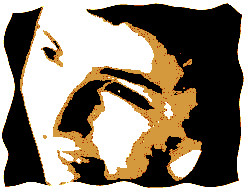Film Review

Of Epstein's Breton poems, this is by far the grimmest, as bleak in its subject matter as in its location. Unusually, its author shows far more interest in his human protagonists than in the raw natural landscape, which serves as little more than a suitably dour backdrop. The island setting is far more forbidding than in Epstein's previous films, and has noticeably less of an anthropomorphic character. Photographed through various gauzes and filters, it is steeped in subtle menace, and there is a feeling of claustrophobia that tightens as the story builds to its tense climax. There is also a greater preponderance of interior scenes (which constantly emphasise the appalling poverty in which the islanders live) and a return to the massive close-up of Epstein's early experimental years. It is through the director's deft use of the close-up that we gain admission to his protagonists' closeted private world and fully appreciate the extent of their remoteness - as much from each other as from the world community. In none of Epstein's other Breton films do his characters more resemble a damned remnant of humanity, clinging to life on the most inhospitable scrap of land as they fall prey to the most deplorable of human vices.
Continuing the experiment of his previous Breton films, Epstein assembled his entire cast from locals on the island, having first gained the support and confidence of an important member of the community - on this occasion the island's rector Abbé Jégo. The principal roles of the old man and his daughter were given to two characterful individuals, Martin le Scoarnec and Adelina Le Gurun, with Rémy Blanchet (the grandfather of a subsequent mayor of the island) taking the part of the handsome hero. Jego also appears in the film as himself, and cuts a bizarre figure as he crosses the misty, barren landscape in his rector's garb with a raised rifle and a dog at his heels, looking like something out of a Luis Buñuel film. The stiff performances are redeemed by some memorably stirring close-ups, particularly those of Le Gurun. The latter's uncomprehending grief after the sudden death of her father and subsequent expression of abandonment as she is pulled beneath the treacherous sinking sands provide the film with its moments of raw visceral engagement. A striking impressionistic sequence, showing the imagined wedding of the seemingly doomed heroine superimposed on a glistening calm sea, is another inspired touch.
L'Or des mers is a film that has considerable artistic merit, but it has one glaring deficiency - the most ineptly applied soundtrack. Even though Jean Epstein went about making the film as if it were a silent piece, it was inevitable that it would be released as a sound film, since, by this time (late 1931) there was little commercial value in silent cinema. The film was in fact commissioned by Synchro-Ciné which, since its foundation by Charles Delacommune in 1920, had striven to develop a sound system that would revolutionise cinema. Synchro-Ciné had already hired Epstein to direct a (now lost) documentary Notre-Dame de Paris and some of its chansons filmées, short films (between three and five minutes in duration) that combined songs and images (a precursor to today's pop video) - these include Le Cor, Le Vieux chaland and Les Berceaux.
It is fair to say that in the process of adding sound to the film, Synchro-Ciné effectively destroyed L'Or des mers. It's bad enough that absolutely no attempt was made to try to synchronise the spoken dialogue with the actors' lip movements, with results that are unintentionally comical. In addition, the company had to tack on some completely superfluous narration (which has the absurd portentousness of an over-earnest public information film) and an incredibly over-the-top musical score that could not be more out of sympathy with the images if it tried. Although the film was praised in some quarters on its release in 1933, its soundtrack was almost universally reviled and was probably the main reason why it failed so spectacularly to attract an audience. Epstein conceived L'Or des mers as a silent film, he made it as if it were a silent film, so the only way to fully appreciate the power of the piece is to watch it as a silent film, with the sound implacably turned off. Never has the adage 'silence is golden' felt more apt.
© James Travers 2016
The above content is owned by frenchfilms.org and must not be copied.
Film Synopsis
Hoëdic is one of the poorer islands in the Breton archipelago off the coast of northwestern France. It is a desolate expanse of rock inhabited by a hundred fishing families who, unable to work for half of the year, live in extreme poverty, dependent on alms supplied by their kindly rector. The poorest of the island's poor is Quoirrec, an old man who lives apart with his daughter Soizig. One day, Quoirrec comes across a little box that has been washed up on the seashore. Greedily, he takes the box and stows it away behind some rocks on the most inaccessible part of the beach. He does not know that he has been spied on and within no time it is all over the island that the old man has found a large quantity of gold.Immediately, the islanders begin to treat Quoirrec very differently from before. They greet him, flatter him, offer him tobacco and even ply him with drink. Quoirrec drinks so much that he wanders off in a daze and promptly suffers a fatal seizure. The old man has barely been laid to rest before the islanders switch their attention to his daughter, who was let into his secret just before he died. The only person to see Soizig's real worth is a young fisherman, Rémy, who considers taking her as his wife. His father forbids the marriage unless the young woman hands over to him the stash of gold she inherited from her father. Soizig has no choice but to go and fetch the gold, but in doing so she is caught in a quagmire and is slowly sucked beneath the wet sand. Rémy risks his life to save her, knowing that she is more precious than her father's treasure - treasure which turns out to be nothing more than a few worthless tin cans...
© James Travers
The above content is owned by frenchfilms.org and must not be copied.
Similar Films
Here are some other films you may enjoy watching:Film Credits
- Director: Jean Epstein
- Photo: Albert Brés, Charles Matras
- Cast: Martin le Scoarnec (Quoirrec), Adelina Le Gurun (Soizig), Rémy Blanchet (Rémy), Abbé Jégo (Rector)
- Music: Thomas de Hartmann, Marcel Devaux
- Country: France
- Language: French
- Support: Black and White
- Runtime: 73 min
The best of Russian cinema

The best of American film noir

The greatest French film directors
